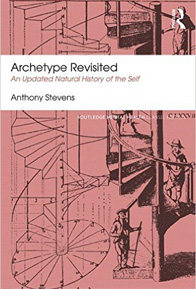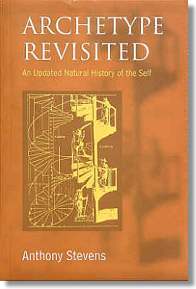| ARCHETYPE REVISITED: | |||
| AN UPDATED NATURAL HISTORY OF THE SELF (2002) | |||
| by Anthony Stevens | |||
| Publishers | |||
| Published by Brunner-Routledge, London (2002); Inner City Books, Toronto (2003), Routledge Mental Health Classic Edition (2015) | |||
| Publishers Description | |||
| Archetype: A
Natural History of the Self, first published in 1982, was a
ground-breaking book: the first to explore the connections between Jung's
archetypes and evolutionary disciplines such as ethology and sociobiology,
and an excellent introduction to the archetypes in theory and practical
applications as well. C.G. Jung's 'archetypes of the collective unconscious' have traditionally remained the property of analytical psychology, and been commonly dismissed as 'mystical' by scientists. But Jung himself described them as biological entities, and which, if they exist at all, must be amenable to empirical study. In the work of Bowlby and Lorenz, and in recent studies of the bilateral brain, Dr Anthony Stevens has discovered the key to opening up this long-ignored scientific approach to the archetypes, originally envisaged by Jung himself. At last, in a creative leap made possible by the cross fertilization of several specialist disciplines, psychiatry can be integrated with psychology, with ethology and with biology. The result is an immensely enriched science of human behaviour. In this revised and updated edition, Anthony Stevens considers the enormous cultural, social and intellectual changes that have taken place in the past 20 years, and includes: Reviews "This is a very welcome arrival after nearly twenty years since the first edition. The new publication is not only a new edition of the original work, but we have the pleasure of reading an update at the end of each chapter. Dr Anthony Stevens is revisiting his Natural History of the Self. "The whole publication is a continued quest by the author to present scientific evidence for Jungís theory of archetypes, and Stevens produces a well researched and sparklingly original approach to understanding the psychology of Carl Gustav Jung. Dr Stevens is himself in a strong position to propose and debate these controversial issues linking Jung with the ethologists, experimental and developmental psychology, neuroscience and evolutionary psychology and psychiatry. He approaches the subject with his own background in experimental psychology, medicine and psychiatry, analytical psychology and a lifetime of varied clinical experience. It would be foolish to omit that a big influence on the authorís life was Irene Champernowne, herself a biologist, psychologist and analyst, an analysand of Jung and a pupil previous to that of Alfred Adler. Stevensís credentials therefore speak for themselves. "This book I hope will become a standard text for all budding Jungian analysts. More than that. It should be read by all in clinical and academic psychology and psychiatry so as to open the minds and traditions of what is all too often a doctrinaire and dogmatic education." "Reading this book is an enlightening
experience. Stevens draws the reader into a wide landscape of exploration
which brings with it new and interesting insights and connections. He has
endeavoured to cover all aspects of what is meant by the term 'archetype'
and to bring the reader up to date with current research and ideas... The
book itself is an archetypal exploration of the spectrum of what it means
to be human and to live and express humanness and, as such, is an
important contribution which is well worth reading." Order this book online |
|
||

